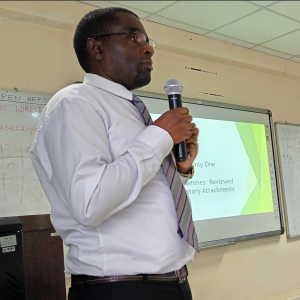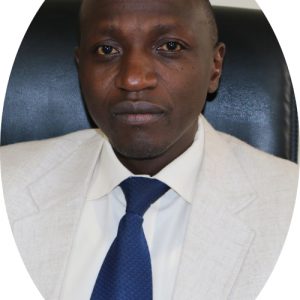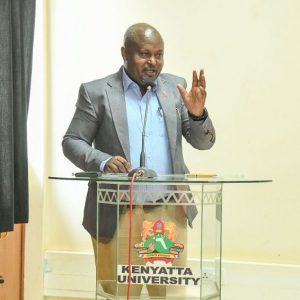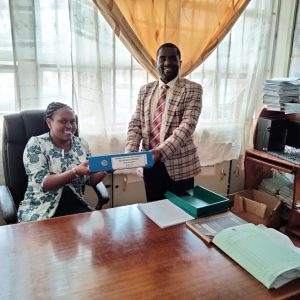Dr. Joseph Mung'atu Senior lecture in the Department of Statistics and Actuarial Sciences, Jomo Kenyatta University of Agriculture and Technology, Dr Charity is the current chairperson of the department of Statistics and Actuarial Sciences
Department of Statistics and Actuarial Sciences

Prof Anthony Waititu Addressing Members of the Department during scientific conference at Sajorec JKUAT
The Department of Statistics and Actuarial Sciences at Jomo Kenyatta University of Agriculture and Technology (JKUAT) is a leading center for training, research, and innovation in data science, statistics, and actuarial practice. We are committed to equipping learners with strong analytical, quantitative, and problem-solving skills that meet the demands of today’s dynamic and data-driven world.
At the undergraduate level, the Department offers five distinct programmes: BSc Actuarial Science, BSc Financial Engineering, BSc Statistics, BSc Biostatistics, and BSc Operations Research. At the postgraduate level, we provide advanced training through our Master’s and PhD programmes in Statistics and Applied Statistics.
With dedicated faculty, industry linkages, and a strong research culture, we prepare our graduates to make meaningful contributions in finance, insurance, health, technology, policy, and other sectors where data-driven insights are critical. We welcome students, researchers, and collaborators to be part of our vibrant academic community.
The Department of Statistics and Actuarial Sciences is a vibrant academic hub within [JKUAT UNIVERSITY], dedicated to advancing knowledge in the fields of statistics, actuarial science, financial engineering, biostatistics, and operations research. Our department is committed to providing high-quality education, conducting cutting-edge research, and fostering a collaborative learning environment.
Programs Offered:
Bachelor of Science in Actuarial Science (BSc Actuarial Science): This program is designed to equip students with the mathematical, statistical, and financial skills necessary for risk assessment and management. Graduates are prepared for careers in insurance, pension funds, investment, and other financial institutions, with opportunities to pursue professional actuarial qualifications.
Bachelor of Science in Financial Engineering (BSc Financial Engineering): This interdisciplinary program combines principles from finance, economics, mathematics, and computer science to develop innovative financial products and strategies. Graduates are well-equipped to work in banking, investment management, financial consulting, and other sectors requiring complex financial modeling and analysis.
Bachelor of Science in Statistics (BSc Statistics): This program provides a strong foundation in statistical theory and methods, with applications in various fields such as economics, medicine, social sciences, and engineering. Graduates are trained to analyze data, design experiments, and make informed decisions based on statistical reasoning.
Bachelor of Science in Biostatistics (BSc Biostatistics): Focusing on the application of statistical techniques to the biological and health sciences, this program prepares students for careers in public health, clinical trials, epidemiology, and medical research. Graduates play a critical role in interpreting data and making evidence-based decisions in healthcare and related fields.
Bachelor of Science in Operations Research (BSc Operations Research): This program emphasizes the use of mathematical models, statistical analysis, and optimization techniques to solve complex problems in business, industry, and government. Graduates are prepared to work in logistics, supply chain management, production planning, and decision support systems.

Prof. Anthony Waititu
Prof Antony Waititu: Senior lecture in the Department of Statistics and Actuarial Sciences, Jomo Kenyatta University of Agriculture and Technology. Prof Waititu is the current dean in the school of Physical and Mathematical Sciences under college of Pure and Applied Sciences (COPAS)

Prof George Orwa
Prof. George Orwa : Senior lecture in the Department of Statistics and Actuarial Sciences, Jomo Kenyatta University of Agriculture and Technology. Prof Orwa is the current Deputy Principal Academic and Student Affairs at Bomet University college. Read More

Prof. Samuel Mwalili
Prof Samuel Mwalili : Senior lecture in the Department of Statistics and Actuarial Sciences, Jomo Kenyatta University Agriculture and Technology.
| UNDERGRADUATE COURSES | MASTERS COURSES | DOCTORATE COURSES |
| Bsc Actuarial Sciences | Msc Statistics | PhD Statistics |
| Bsc Financial Engineering | Msc Applied Statistics | PhD Applied Statistics |
| Bsc Statistics | ||
| Bsc Biostatistics | ||
| Bsc Operation Research |
The Department of Statistics and Actuarial Sciences at JKUAT offers a wide range of undergraduate and postgraduate programmes designed to prepare students for careers in data-driven industries. To help you learn more about each programme, we have provided detailed brochures with information on course structure, entry requirements, and career opportunities.

1. BSc Actuarial Science
-
Risk Modeling in Insurance – Developing models to predict claims frequency and severity for life and general insurance.
-
Pension Fund Valuation – Assessing long-term sustainability of pension schemes under demographic and economic uncertainties.
-
Financial Risk Management – Applying actuarial methods to measure and mitigate market, credit, and operational risks.
-
Survival Analysis – Using statistical tools to study life expectancy and mortality rates in different populations.
-
Actuarial Applications of Big Data – Leveraging data science techniques to improve underwriting and pricing models.
2. BSc Financial Engineering
-
Derivatives Pricing Models – Developing and testing models for options, futures, and other derivatives.
-
Algorithmic Trading – Designing and evaluating automated trading strategies using mathematical models.
-
Portfolio Optimization – Applying optimization methods to balance return and risk in asset management.
-
Cryptocurrency and Blockchain Finance – Investigating volatility, pricing, and risk of digital assets.
-
Credit Risk Modeling – Developing predictive models for assessing borrower default risk.
3. BSc Statistics
-
Survey Design and Analysis – Creating efficient sampling strategies for national surveys and censuses.
-
Time Series Analysis – Studying trends, cycles, and forecasts in economic, agricultural, or climate data.
-
Bayesian Statistics – Applying Bayesian methods to update predictions with new evidence.
-
Machine Learning in Statistics – Using statistical learning techniques for data classification and prediction.
-
Quality Control and Reliability – Applying statistical methods to monitor and improve industrial processes.
4. BSc Biostatistics
-
Epidemiological Modeling – Using statistical models to study the spread of infectious and chronic diseases.
-
Clinical Trials Analysis – Designing and analyzing randomized controlled trials for medical interventions.
-
Health Data Analytics – Applying statistical methods to hospital, demographic, and health survey data.
-
Survival and Hazard Modeling – Analyzing patient survival times and risk factors in medical studies.
-
Public Health Policy Evaluation – Assessing the impact of interventions such as vaccination or nutrition programs.
5. BSc Operations Research
-
Supply Chain Optimization – Studying models to improve logistics, warehousing, and distribution efficiency.
-
Transportation Systems Analysis – Designing cost-effective and time-efficient transportation networks.
-
Decision Support Systems – Developing mathematical models for managerial decision-making in uncertain environments.
-
Queuing Theory Applications – Modeling waiting lines in hospitals, banks, or telecommunication systems.
-
Project Scheduling and Resource Allocation – Optimizing the use of time, labor, and capital in projects.
Contact Us — Department of Statistics & Actuarial Sciences
For all enquiries regarding admissions, programme details, or departmental support, please reach out to:
-
Chair, Department of Statistics and Actuarial Sciences
Email: stacs@fsc.jkuat.ac.ke
Phone: +254 (67) 52218
Fax: +254 (67) 52089
Director, Academic Development Programme (ADP)
Email: adp@fsc.jkuat.ac.ke
Tel: (067) 52181-4 / 52711, Ext 6119
University General Contact (Juja Main Campus):
Phone(s): 067-5870001-5, 0709715815 JKUAT
Postal Address: P.O. Box 62 000 – 00200 Nairobi, Kenya
1. BSc Actuarial Science
Q1: What is Actuarial Science about?
A: Actuarial Science applies mathematical, statistical, and financial theories to assess risk and uncertainty in industries such as insurance, pensions, banking, and investments.
Q2: What are the entry requirements?
A: Applicants must meet JKUAT minimum university entry requirements, with strong performance in Mathematics and English.
Q3: What career opportunities are available?
A: Graduates work as actuaries, risk analysts, data scientists, financial consultants, insurance underwriters, and pension managers.
Q4: How long does the programme take?
A: The programme runs for four academic years, full-time.
Q5: What professional certifications align with this course?
A: Graduates are well-prepared to pursue professional actuarial examinations (SOA, IFoA, or CAS).
2. BSc Financial Engineering
Q1: What does Financial Engineering involve?
A: It focuses on applying mathematical models, computational tools, and financial theories to solve complex problems in finance and investment.
Q2: Who should study this programme?
A: Students passionate about finance, mathematics, programming, and innovative financial product design.
Q3: What are the career prospects?
A: Graduates work as quantitative analysts, investment bankers, financial risk managers, portfolio managers, and fintech developers.
Q4: Is computing emphasized in the course?
A: Yes. The programme integrates programming, data analysis, and financial modeling.
Q5: How long does the programme take?
A: It is a four-year full-time undergraduate degree.
3. BSc Statistics
Q1: What does the Statistics programme cover?
A: It equips students with skills in statistical theory, data analysis, probability, and applications in business, health, and research.
Q2: What are the entry requirements?
A: Applicants must satisfy the university entry requirements with a good background in Mathematics.
Q3: Where can graduates work?
A: Graduates can work as statisticians, data analysts, research officers, survey designers, and government policy advisors.
Q4: Is this programme suitable for postgraduate studies?
A: Yes, it provides a strong foundation for MSc/PhD in Statistics, Biostatistics, Data Science, and related fields.
Q5: What is the duration of the course?
A: Four academic years, full-time.
4. BSc Biostatistics
Q1: What is Biostatistics?
A: Biostatistics applies statistical methods to biological, medical, and public health research.
Q2: Why study Biostatistics?
A: It is critical in analyzing health data, designing clinical trials, and supporting evidence-based medical decisions.
Q3: What career opportunities exist?
A: Graduates work as biostatisticians, health data analysts, epidemiologists, clinical trial specialists, and researchers in hospitals, NGOs, and government.
Q4: How long does the course take?
A: Four years, full-time.
Q5: What unique skills will students gain?
A: Expertise in statistical modeling, health informatics, and epidemiological research methods.
5. BSc Operations Research
Q1: What is Operations Research (OR)?
A: OR uses mathematical models, optimization, and analytical methods to aid decision-making in industries and organizations.
Q2: Who should study this programme?
A: Students interested in problem-solving, mathematics, logistics, and decision sciences.
Q3: What career paths are available?
A: Careers include operations analyst, logistics manager, supply chain planner, systems analyst, and management consultant.
Q4: Is computing involved in the course?
A: Yes. OR heavily uses software tools and computer simulations to solve real-world problems.
Q5: How long does the programme take?
A: It is completed in four academic years.
6. MSc Applied Statistics
Q1: What is the focus of this programme?
A: It provides advanced training in applied statistical methods and their applications in various fields.
Q2: Who can apply?
A: Applicants must hold a Bachelor’s degree in Statistics, Mathematics, or a related quantitative field.
Q3: What are the career opportunities?
A: Graduates can work as senior statisticians, data scientists, biostatisticians, policy analysts, or academic researchers.
Q4: How long does the programme take?
A: Typically 2 years full-time, with coursework and a research thesis.
Q5: Is research emphasized?
A: Yes, students conduct independent research projects addressing real-world statistical challenges.
7. PhD Statistics
Q1: What is the objective of the PhD in Statistics?
A: To produce highly skilled researchers and professionals capable of advancing statistical knowledge and practice.
Q2: What are the entry requirements?
A: Applicants must have a Master’s degree in Statistics or Applied Statistics from a recognized institution.
Q3: What does the programme involve?
A: Advanced coursework, seminars, and original research culminating in a PhD thesis.
Q4: What are the career prospects?
A: Graduates work as university lecturers, senior researchers, consultants, and industry experts.
Q5: How long does the programme take?
A: The PhD programme typically takes 3–4 years full-time.

